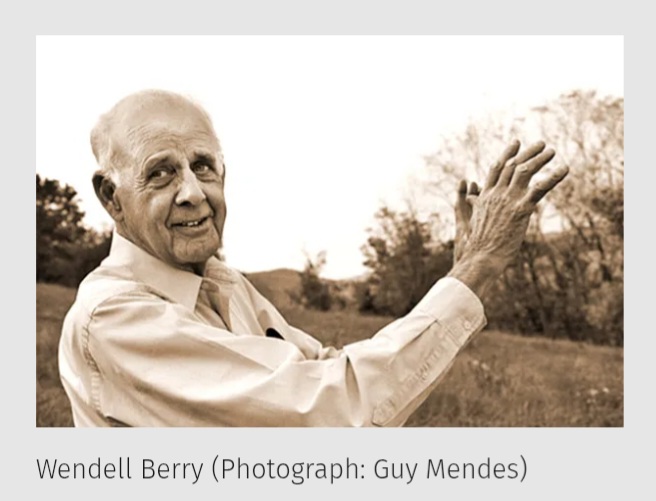When despair for the world grows in me
and I wake in the night at the least sound
in fear of what my life and my children’s lives may be,
I go and lie down where the wood drake
rests in his beauty on the water, and the great heron feeds.
...I rest in the grace of the world, and am free.
— Wendell Berry, The Peace of Wild Things
In an age dominated by noise, speed, and digital distraction, Wendell Berry stands as a quiet force—a writer whose words root us in the natural world and in the values of community, sustainability, and reflection. A poet, novelist, essayist, and farmer, Berry has spent his life writing about the land and the people who live close to it, with a moral clarity that resonates more urgently with each passing year.
A Life Anchored in Place
Born in 1934 in Henry County, Kentucky, Berry has spent the majority of his life in his home state, choosing to live and farm there rather than follow the path of academic or literary celebrity. His commitment to “place” is not just geographical but philosophical. In his essays, Berry often argues that true environmental and cultural stewardship begins at home—on the land one knows and in the community one serves.
This devotion to local life isn’t escapism—it’s resistance. Berry’s lifestyle and writing offer a critique of industrial agriculture, consumerism, and the alienation of modern life, while proposing an alternative rooted in fidelity to the earth, to neighbors, and to old-fashioned work.
Poetry of Reverence and Resistance
Berry’s poetry is deceptively simple, filled with plainspoken language and pastoral imagery. But within that simplicity lies a radical spirit. His poems call us to slow down, to see, and to remember what matters.
Nature, in Berry’s work, is not mere background—it’s healer, witness, and teacher. Whether through a wood drake or a patch of farmland, Berry offers us a path back to inner stillness and moral clarity.
Notable Works
Berry’s literary output spans genres, but a few works stand out as central to his vision:
• The Unsettling of America: Culture and Agriculture (1977) – A landmark collection of essays that critiques industrial agriculture and its cultural consequences. Still widely cited in environmental and food justice circles.
• Jayber Crow (2000) – A novel about a small-town barber whose gentle wisdom and quiet life bear witness to the unraveling (and the enduring threads) of rural community.
• Hannah Coulter (2004) – Told from the perspective of an elderly woman in Port William, Kentucky (Berry’s fictional stand-in for his real home), this novel explores memory, loss, and the quiet heroism of a life lived in service of others.
• Sabbath Poems (collected across decades) – These meditative poems, written during Sunday walks on his farm, are Berry at his most distilled—spiritual, observant, deeply human.
Why Berry Matters Today
At a time when climate anxiety and social disconnection dominate headlines, Wendell Berry’s work feels less like nostalgia and more like a blueprint. His writing reminds us that sustainability isn’t just about technology or policy—it’s about culture, habit, and care. He writes not to impress, but to impart wisdom; not to entertain, but to engage the heart and conscience.
Final Thoughts
Reading Wendell Berry is like walking into a quiet room after a storm. His words don’t demand your attention—they invite it. Whether through his poetry or prose, Berry offers us an antidote to the dislocation of modern life: the rootedness of story, the sanity of slowness, and the enduring power of love—for land, for people, for life itself.
#WendellBerry #PoetryOfPlace #EnvironmentalWisdom #SlowLiving #IdealHiveVoices #SabbathPoems #PeaceOfWildThings #EcoLiterature #RuralWisdom #LiterarySanctuary
|
|

